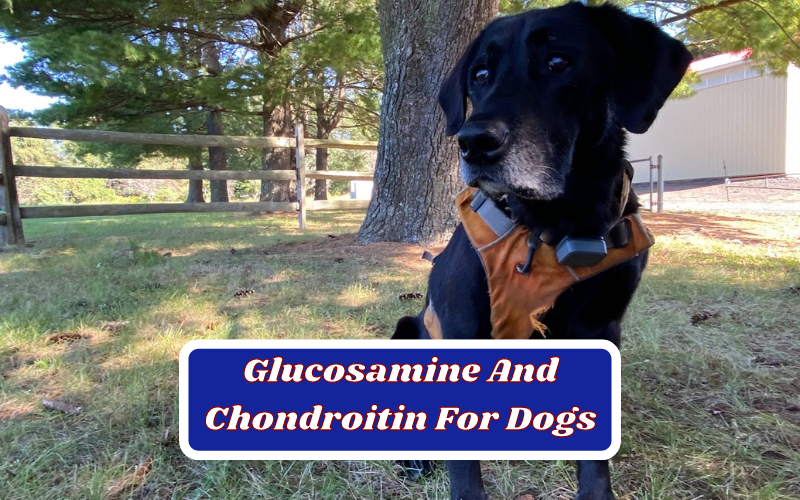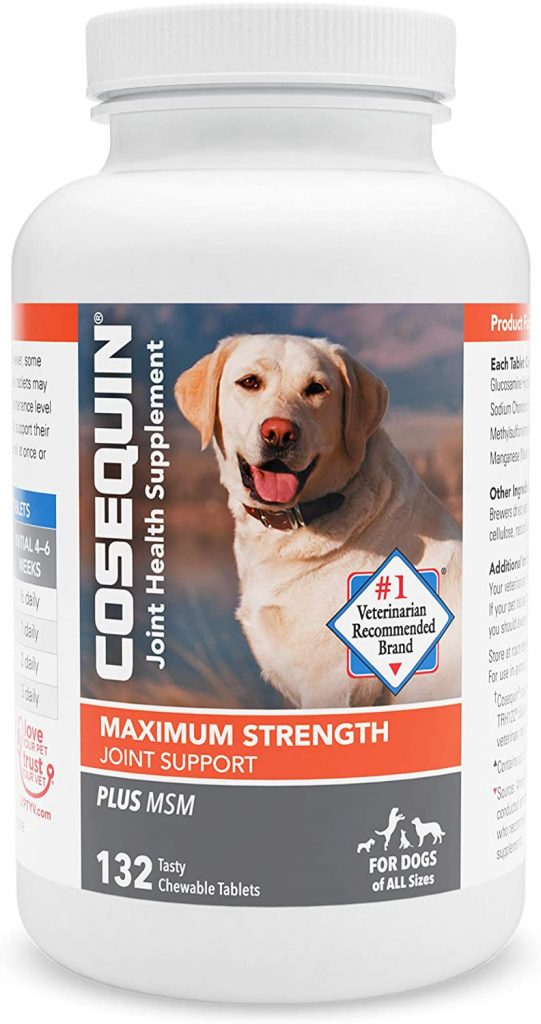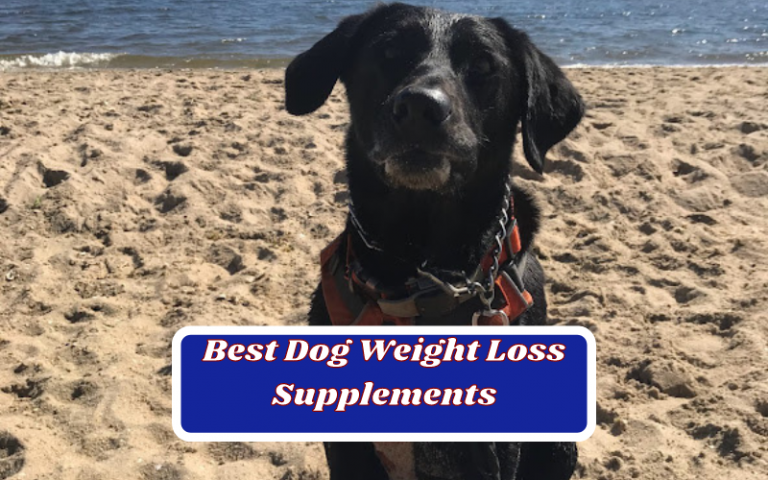Truth About Glucosamine And Chondroitin For Dogs Revealed
* This post contains affiliate links, and we will be compensated if you buy after clicking on our links.

So your dog has joint pain, issues or arthritis? Maybe you heard about this product or supplement that is labeled as glucosamine and chondroitin for dogs or something similar.
Well, you’re not alone. Millions of people every year are looking for solutions for there dogs joint issues and pain.
The truth is as dogs age, arthritis becomes very common.
When cartilage, the tissue that cushions the joints between the bones, starts to thin and deteriorate, a painful condition that affects both dogs and humans develops (this is arthritis.) This results in the ends of the bones begin to rub against one another as a result, and you might notice your dog beginning to limp.
Arthritis may be brought on by trauma, illness, or regular wear and tear from years of use.
But you’re probably asking, questions like “Is glucosamine and chondroitin safe for my dog?” Or “will glucosamine and chondroitin work for my dog?”
And that is exactly what we will be going over in this one.
We will break down whether or not glucosamine and chondroitin for dogs is safe, effective and worth it.
Ready to get rocking? Good, let’s go!
What Is Glucosamine For Dogs?
Glucosamine and chondroitin for dogs is a naturally occurring substance made of glucose and glutamine. It is a sugar and amino acid combo that aids in preserving sound cartilage and healthy joint function / performance.
In addition to causing cartilage cell growth, this substance also regulates the fluid in charge of lubricating the joints.
Now your dog will naturally produces glucosamine as well. But when symptoms like arthritis become apparent, this implies that production may gradually decrease and become unstable. If this happens joint damage is more likely to occur.
An important indicator of not enough or unstable glucosamine production is pain in your dog’s joints. One of the best treatments for dogs where this occurs is giving them glucosamine and chondroitin.
It can be added to dog food or taken as chewable tablets or supplements.
It is one of many natural ingredients, that are used to treat arthritis in people, dogs, horses, and other animals.
What Is Chondroitin For Dogs?
Even though you will mainly hear about glucosamine when it comes to your dogs joint health, it’s not the only ingredient. In addition to glucosamine, chondroitin sulfate is extremely beneficial and recommend. Chondroitin sulfate aids in preserving your dog’s natural joint lubrication’s thickness.
Chondroitin also supports joint support and health.
It helps give structure to your dog’s cartilage and provides compression resistance.
A good amount of chondroitin can be found in food sources like fish, and bird cartilage. Chondroitin is usually included with any supplements that includes glucosamine and they go hand in hand together.
The Benefits of Glucosamine And Chondroitin For Dogs Health

Your dog’s cartilage and natural lubricant begin to deteriorate when arthritis occurs. This is frequently the result of the pressure and trauma that makes moving uncomfortable for your dog.
But with glucosamine and chondroitin, your dog will produce more cartilage cells and synovial fluid. You’ll be able to stop the arthritis from getting worse by giving the proper dosage to your dog.
Some glucosamine and chondroitin for dogs benefits that you will see include: a reduction of pain and discomfort, improve overall joint health and reduce inflammation.
Breakdown Of Glucosamine And Chondroitin For Dogs
Pain Relief
For dogs with joint pain, glucosamine and chondroitin is an excellent pain reliever. The pain is numbed and relieved by the glucosamine. The Chondroitin has more anti-inflammatory properties and focus on that while also reducing further damage.
Supplements containing glucosamine and chondroitin offer quick pain relief for most joint pain issues in addition to arthritis. Your pet may be able to use them for maintenance, depending on the dosage that your vet recommends.
Joint Health
The joints in your dog can be repaired and maintained with chondroitin. Your dog’s joint pain is reduced while the production of cartilage cells and lubricants is increased.
Where To Buy Glucosamine And Chondroitin For Dogs
Nutramax Laboratories COSEQUIN

A high dosed glucosamine and chondroitin for dogs supplement that is highly recommend for any dogs with athirst, joint issues and joint pain.
We highly recommend Nutramax
Are there any risk factors for Glucosamine And Chondroitin?

Avoid giving glucosamine and chondroitin supplements to pets with allergies to them.
Use with caution in animals that have asthma or bronchoconstriction.
Use with caution in pets who need low potassium diets as some formulations contain significant amounts of potassium.
Because its safety has not been examined, glucosamine and chondroitin should be used with caution / avoided in animals that are pregnant or nursing.
Some of the side effects observed in patients taking glucosamine, include:
- Allergies (especially if your dog has an allergy to shellfish)
- Fatigue/Tiredness
- Heartburn
- Drowsiness
- Excessive thirst and urination (at high doses – due to salt)
The Studies
One thing many people do not think about is sodium.
Salt is used during manufacturing to stabilize glucosamine and chondroitin supplements. You should start being aware of how much salt you are actually giving your pet. Too much salt can be very dangerous to your dog.
Many people overlook this, or may not even be aware. That is why giving glucosamine and chondroitin for the full life of your dog, may not be recommend.
Negative Health Benefits Of Too Much Salt
“The sulfate salt is often stabilized with sodium chloride (NaCl) or potassium chloride (KCl), which may be undesirable in aging canines with potential co-morbid medical conditions such as heart failure, hypertension or renal decline. Although this is a theoretical concern, human clinical trials have not demonstrated increases in blood pressure with NaCl content of crystallized glucosamine sulfate (Herrero-Beaumont et al., 2007; Rovati et al., 2012).” Source
What We Recommend
Glucosamine and chondroitin for dogs should only be used when there is a negative impact on your animal’s quality of life.
Maybe your dog is struggling to walk, or has bad arthritis and it is effecting them. If your pet is in pain from arthritis, a joint injury, documented joint problems, or degeneration, then we recommend it.
The time it takes to notice any mobility or comfort benefits should not take longer than 30 days. We recommend adjusting the dosage if there is no improvement.
If improvement is noticed, we advise attempting to taper off to the smallest amount to maintain the pros of the supplement and reduce the side effects.
We would advise against using this as a lifelong preventative. These advantages are not yet proven with studies.
For now, it appears that many people are not taking into account the long-term effects of increased salt consumption when deciding whether to add this as a permanent supplement.
The overall health of your dog should always be a main focus. So always be aware of everything you’re giving them.
Like any supplement, moderation should be ideal.
Finding the Right Dosage Of Glucosamine And Chondroitin?

Your dog’s weight and the severity of their joint condition determine how much glucosamine and chondroitin is best for them.
Here are some general ideas to get you started:
Glucosamine Recommendations for Dogs
250-500 mg for 5-25 pounds dogs
500 mg for 25-50 pounds dogs
1,000 mg for 50-80 pounds dogs
1,500 mg for dogs weighing more than 80 pounds
Chondroitin Recommendations for Dogs
In general, glucosamine supplements for dogs are given along with chondroitin and are dosed according to the chondroitin content. On the label of the majority of products are instructions.
Whatever brand you purchase from, will have guidance on the dosage amounts and how many tablets/chews you should give your dog (based on there weight.)
have it down pat with each dog separately, try using it to untangle leash tangles.
Avoiding Giving To Much & Overloading Their System
There are basically only two ways for your dog to have too much glucosamine and chondroitin in their system.
1) A Supplement Overdose
Most canine joint supplements are available as soft chews/ treats. They usually taste pretty good and if you put them in a place where your dog can get to it, they may eat the entire bottle and overdose.
Glucosamine is more of a food supplement than a drug or prescription, so toxic overdoses in dogs from glucosamine ingestion would only happen in extremely rare circumstances. Your dog would probably vomit and/or have diarrhea, but there should not be any long-term effects.
So like any treats, make sure your dog can’t get to them.
2) Sources of Glucosamine
Your dog may be receiving glucosamine from other sources. For instance, some kibble brands include glucosamine and chondroitin. While a little more won’t hurt much, too much kibble will not only make them fat but may also cause them to have too much glucosamine in their bodies.
3) Too Much Salt
One that is not talked about enough, is too much salt. Too much salt can quickly cause a dog’s cells to become dehydrated. Because of the swelling of the brain, severe dehydration can cause visible lethargy, confusion, and other negative neurological effects. Due to high sodium levels in their system, your dog may also experience muscle cramps and stiffness in their joints.
Dogs who consume too much salt may experience seizures, muscle tremors, vomiting, and diarrhea. Providing access to clean drinking water lowers the possibility of canine salt toxicity.
Signs That Your Dog Needs Glucosamine And Chondroitin
The fact that glucosamine and chondroitin act quickly to reduce pain make it very popular. But treating illnesses when they are still in the early stages is the fastest way to stop them.
Arthritis is a joint condition, ke in humans. It is said to have inflammatory joint disease.
This causes a loss of joint motion, stiffness, and even lameness as a result. Old age can cause osteoarthritis in older dogs. However, arthritis can occasionally develop earlier.
If you notice your dog having any of the following:
- Stiffness (this may increase in the morning or during cold weather)
- Difficulty jumping up or getting down from higher levels
- Does not want to get up
- Difficulty in climbing beds/staircases
- Difficulty jumping
- Limping
- Pain from walking
If you notice any of these, glucosamine And chondroitin may be beneficial.
When Should I Not Give My Dog Glucosamine And Chondroitin?
There are some circumstances, in which it’s not advised for your dog to take these supplements. Here are a few scenarios that you should think about.
Remembering that glucosamine is an amino sugar is the first step, so dogs with diabetes need to speak to there vet.
Dogs who are taking blood-thinning medications should not take chondroitin sulfate. The substance shares the same structure as the drug heparin, which thins the blood.
Dogs with shellfish allergies are also unable to consume glucosamine or chondroitin. Although allergies to shellfish in dogs are uncommon, they are not unheard of. The fact that many of these supplements are made from crustacean shells may be harmful to your allergic dog.
Lastly, if your dog does not have any joint issues, they most likely don’t need it. While there isn’t any evidence at the moment to support the use of supplements to stop dog arthritis, they do help to support the joints.
Always remember to get your veterinarian’s advice. You could choose an alternative, such as glucosamine hydrochloride.
Glucosamine And Chondroitin For Dogs FAQs
What advantages does chondroitin have for my pet?
Pets with arthritis may notice a significant decrease in pain, resulting in improved mobility in their affected joints. More exercise can result from this, helping boosts strength, reduce weight and helping your dog become overall more healthy.
How well does chondroitin work?
One of the most popular nutraceuticals is chondroitin. Animals appear to respond differently to chondroitin supplementation, but it may be very helpful in reducing painful lameness.
Should my Dog take Glucosamine?
Before giving your dog joint health supplements, look for the following signs in your pet:
- Joint pain/limpness
- Unwillingness to jump up or down stairs
- Being reluctant to move quickly
It would be wise to discuss using these supplements with your veterinarian if these symptoms occur.
Do I need to be aware of any drug reactions?
When combined with glucosamine/chondroitin, the following drugs should be administered with extreme caution: anti-diabetics, doxorubicin, etoposide, heparin, or warfarin.
Supplements, herbal remedies, and vitamins may interact with each other, as well as with over-the-counter and prescription drugs. It always smart to discuss any medications / supplements that your dog is taking to your veterinarian.
Final Verdict
Dogs can develop joint pain and issues at any age. It’s recommend for dogs to take glucosamine and chondroitin to help stop or slow down the progression of arthritis.
But if your dog does not show any of these symptoms, it is not worth it to give them it.
We hope we were able to answer all your questions about glucosamine and chondroitin for dogs, if it is worth it, and if you should give your dog it.
Jacktra is dedicated to protecting animals everywhere. You can contribute to that by using our free services, spreading our message, and reading our articles.







One Comment